
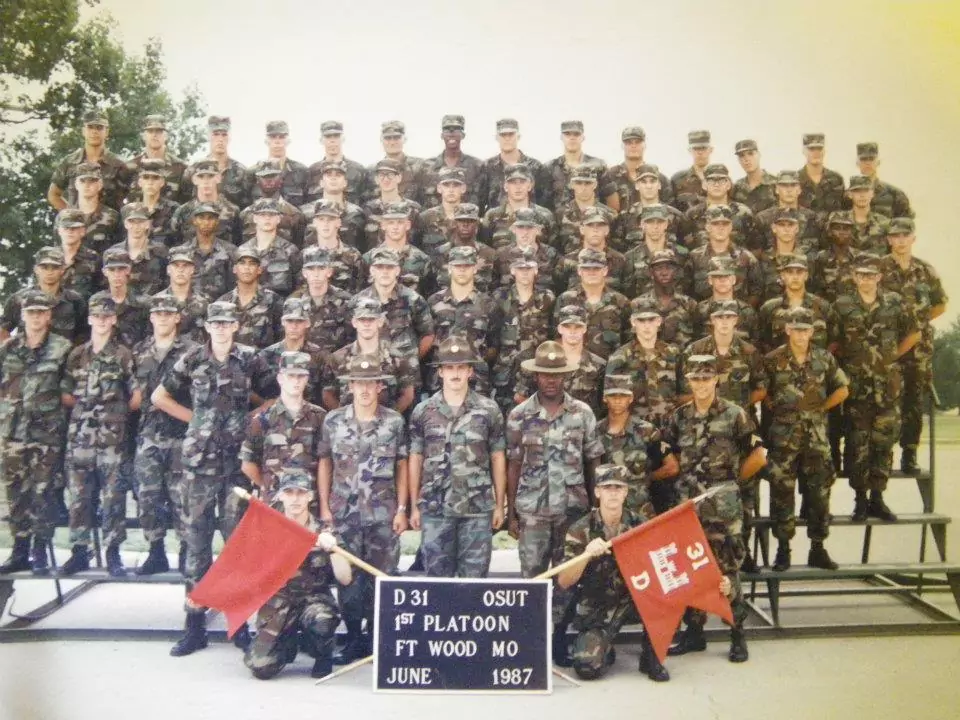
Each year on November 11, millions of Americans and people across the world observe Veterans Day. Once known as Armistice Day, Veterans Day is a commemoration for all veterans—a way to remember and thank them for their commitment, sacrifice, and bravery.
As a company born from expertise acquired through Israel military intelligence experience, it’s a privilege for Taranis to acknowledge the sacrifices made by veterans and their families. More than 50% of Taranis employees have served their country in the military. Much like recording the story of every field to review season after season, we believe one of the best ways to preserve any legacy is to record and archive the story for future generations.
In observance of Veterans Day 2022, we interviewed a few of our own heroes and will submit their firsthand stories to the U.S. Library of Congress’ Veterans History Project, which preserves the personal accounts of American war veterans so that future generations may hear directly from veterans and better understand the realities of war.
Taranis role: Vice President, Sales
Home state: Wisconsin
Military branch: Army
Rank: Captain
Service period: 1990-2002
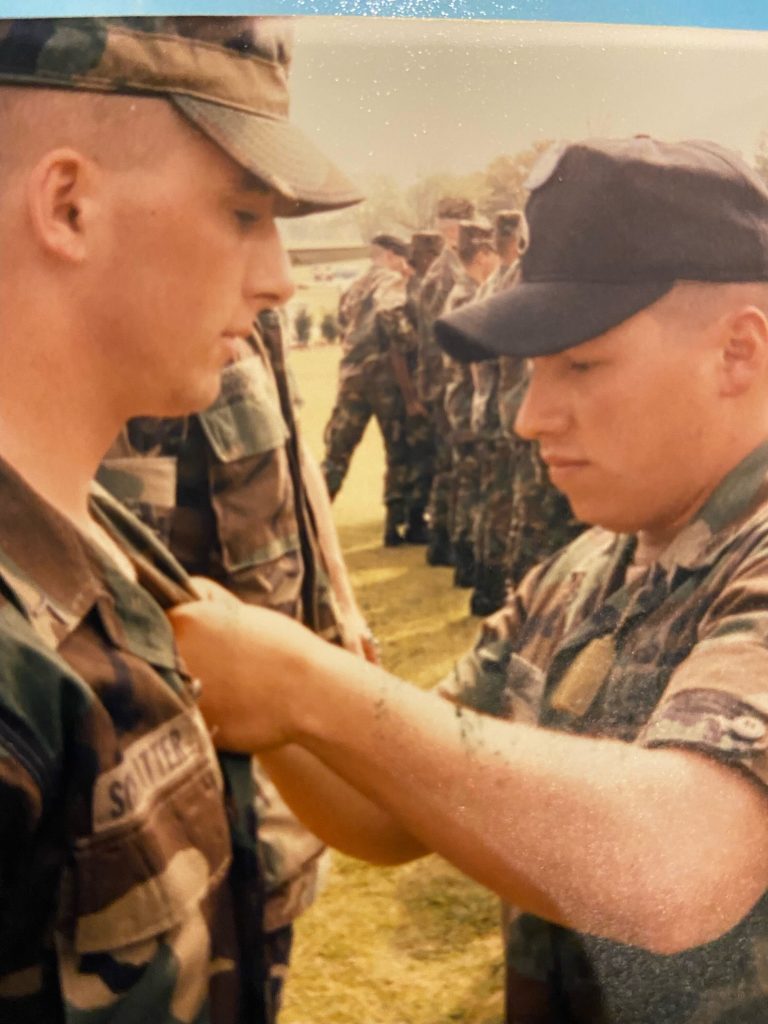
“Serving my country was an honor and privilege—to see what we did for other people. You drive into a village or go into a small town where some really bad things have been happening…and to have the kids come out and say thank you or high five… For me, on our deployments and training in Germany and across Europe, it was always about the kids—they’re innocent. They haven’t done anything wrong. It doesn’t matter if they’re Muslim or Catholic or CRO or Serb. We were just trying to make a better life for them.”
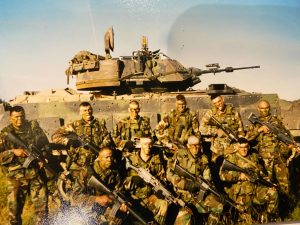
I had gone to Germany in August, and the way the rules were at that time, you couldn’t have a spouse unless you had housing, and we didn’t have housing secured. It took about a month to get my wife, Lisa, over there. About the time that she came to Germany, we left for six months. So we kind of said hello and goodbye at the same time. And she got to enjoy Germany for six months without me and was able to go to Octoberfest and have fun while we were running patrols in Macedonia [laughs].
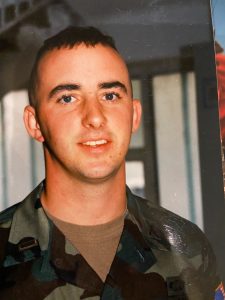
I joined the infantry because I wanted the true soldier experience. I had a really good idea of what I was getting myself into, though there were definitely points where I questioned whether I thought this through completely.

9/11 was probably the most impactful day of my generation’s life. That day has burned into my head so, so deeply. The details that I can tell you about that day started off fairly normal. We were in Fort Hood, and I was working as Chief of Plans for Second Brigade for the Infantry division. I had done PT on my own at home and got in the car, headed to the office and had the radio on. And of course, I heard some news about a plane that had hit the World Trade Center.
So, I arrived at the office. Colonel Rogers was the Commander of the brigade at the time, and he was meeting with a General in the conference room, giving a briefing on the readiness status of the brigade. And at the time, Fourth Infantry Division was the first digitized division in the US Army, which meant every vehicle had a gps heads up display, had laser range finders, communication systems…it was very top notch. So as the brigade staff we always had monitors showing where every vehicle in the division was. We typically had CNN on one screen and then a screen that we use for operations.
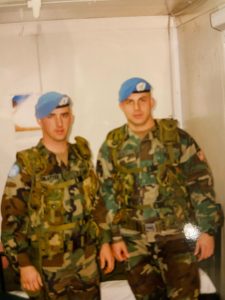
We sat there and watched as the second plane hit the tower at that point. As we watched live footage, you could tell that it was more than Cessna making a mistake. My boss, Pete, was in the briefing. Those guys had been in there for a while and hadn’t heard any of the news. So, I took a post-it note and wrote a quick note saying, “Something’s going on. Second plane has hit the World Trade Trade Center.” I placed it in front of my boss. He looks at me like, “Do I know what I said?” Then the next plane hits the Pentagon. I take another post-it note, write on it, and put it in front of him. Then he gives me the real “Are you crazy?” look, and I’m like, “Yeah, this is not a mistake.” So, he interrupts the briefing, and the Colonel and General come out and we watch CNN for a little bit. At that point the General says, “Okay, we need to stop this briefing.” I then need to get where I need to get. Over the course of the next 18 hours or so, Fort Hood went from a nice, friendly, and inviting place to a lockdown where every vehicle in and out was searched. We had light machine guns on the corners of every building, concertina wire all over the place. And I got home the next morning about 2:00 AM, packed a bag, kissed Lisa [my wife] goodbye and said, “I don’t know when I’m coming back, but it’s probably gonna be a while.” And we all know what happened after that.
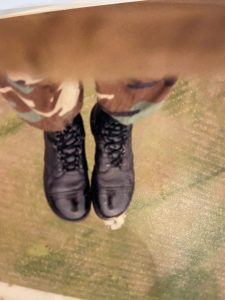
You get used to being apart—which is good, right? I think it makes a relationship stronger when both individuals can be apart and then come back together. When you’re used to doing your thing or focus on your mission and she’s focused on hers or vice versa, and then you come back together and all of a sudden you gotta run a household together again. It’s a little bit different than most people experience. But as far as advice, one of the things that Lisa and I decided to do when I first got commissioned was to take that first duty station overseas and take advantage of it. We were able to see every country in Western Europe on the weekends when I wasn’t deployed or out training. So, we always joke that when I got done working and got to take off my rucksack I put on a civilian one and followed her around the 26 countries. I had a lot of fun at the same time. So, I guess the advice there is to take advantage of it and go have fun when you can.
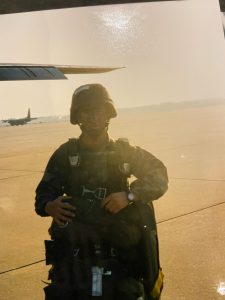
I’ve had a good mix of ag and military my whole life. So, I grew up on a dairy farm and did not not shy away from hard work. The military was the same way. We worked really hard when we were working, and we played really hard when we were playing. But it was always focused on what we needed to do. As an American producer, you’re trying to make sure that you’re able to be the next generation for that family farm and to better the next generation’s life. And I think it was the exact same way in the military, right? We were there to make people’s lives better no matter what their background was or where they were or where they came from. So that was, I think, very similar. And then, as you know, when I came back to agriculture in a different role, leading a sales team was no different than leading a platoon. Figure out what your mission is and figure out how to get everybody moving in the same direction at the same time and get things done. So I think it’s been very, very similar, honestly.
Taranis role: Director of Operations
Home state: Indiana
Military branch: Air Force
Rank: Major
Service period: 25 years
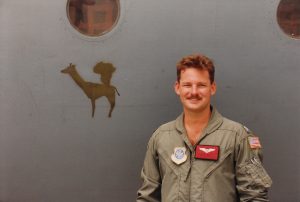
I was an accounting major at Texas Christian University. I stayed at school during winter break to work a job so I could make some money for the next semester. I was sitting on the grassy area in front of my dormitory watching the sky and trying to figure out what I wanted to do. And then an F-105 out of Carswell Air Force Base flew right down University Boulevard, and I was like, “That’s what I want to do.” And that’s all I’ve ever wanted to do. The next day I went to the ROTC department at TCU, set up all my tests, and from there I was a cadet for a couple years until I was commissioned.
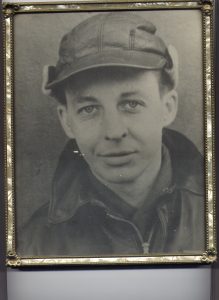
John’s grandfather
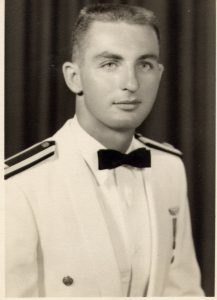
John’s father
I’m what they call a military brat. My father was in the United States Air Force as the command navigator on Air Force One under President Carter and the first term of President Reagan. I was born in Hawaii, and we lived all over the United States over many years until the last few years where my father was in the 89th Mac at Andrews Air Force Base. We moved to Maryland, and that’s where I graduated high school. My dad and my mother retired there. My mother’s father was in the Army Air Force in World War II and transitioned to the United States Air Force. He moved around with them over a number of tours until he retired and went to South Carolina where he played golf every day. And then my father’s father was in the Army Air Corps and was killed in World War II—shot down. I have always known this is what I wanted to do. My grandfather was a pilot, and my father was a navigator—I like the pilot side of the house versus the navigator side of the house.
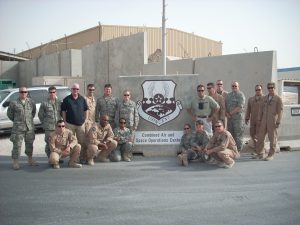
One of the things I started early on in my career is I always took a bag of golf balls wherever I went and put it in the back of the air fight with a golf club. Every country I landed in, I’d hop off the airplane and hit a golf ball down the runway. My guys always thought that was hysterical. I got to play golf around the world, which was a lot of fun. I liked to ride my motorcycle when I was back in the States for one assignment. I also enjoyed training horses. Being a history buff, I liked to go to areas and go experience the culture and eat the food. It was a very rewarding time of my life.
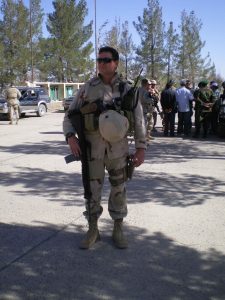
The pilot community in the Air Force is a small band of brothers, and the special operations community is even smaller. It’s very tight knit, and you get to meet some very special people–Special Forces, Navy Seals, Air Force Special Operators…I was just the flying guy. I went into the places that were hard to get into and got to see the heroic abilities of the people I was surrounded by–whether it was people who were flying with me and my crew or it was the guys I had in the back who were going to be the point to the spear doing jobs during the war or conflict.
Knowing what they were doing and seeing them afterward…it’s humbling. A number during those years were killed or injured. I remember them very fondly, like the laughs we had wearing shorts, sitting on a couple lawn chairs in Afghanistan, kicking back [he laughs]. I said, “ If they’d just quit shooting rockets, it wouldn’t be so bad.” We had to make fun in our environment. The Commander when I was in an Air Force unit in Kabul always said, “Embrace the ‘suck’. It can’t get any worse. So, you can only make it better.” And that was a great way of looking at things when we were living in tents, sleeping on cots, eating terrible food–it was horrible. But we always had fun and found laughter.
I was a major in a small little village in Afghanistan with Special Forces Operation Detachment Alpha (SFOD-A). When their commander was killed, we accompanied his remains to Kabul and then to Bogram as he was repatriated to the United States. It was so very moving, it still brings a tear to my eye. He is a hero.
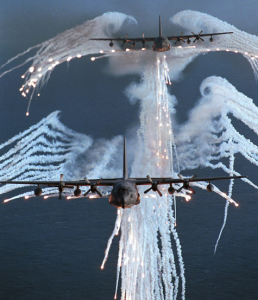
I grew up. I was an immature college graduate and thought I knew everything and very quickly came to know that I didn’t know anything. Learning how to teach and train other people to be better.. and to aspire for more and inspire people. We never stopped. We never went back. We never said, “No, we’re not gonna do it” in training or in combat or in real world execution.
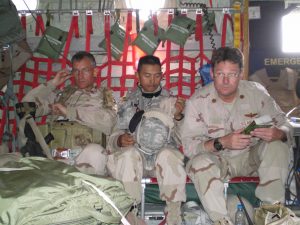
There’s a lot of parallels. And I know from working at Taranis that the dedication of this company is like my military units wanting to succeed and supporting whatever missions that we were given. The aspect of helping is a big part of the military that a lot of people miss. No one in the military wants to go fight. My first experience overseas was famine relief and bringing food to starving people. The large majority of what the U.S. military does is to help people and other countries, and it reminds me of Taranis’ mission to help growers prosper and feed the world. Like many of us in the military, growers are working long hours often in hot, dusty conditions. Our focus is to make their job a little easier and perform even better, which benefits everyone.
Taranis role: Flight Operations Manager
Home state: Indiana
Military branch: Army Reserve
Rank: E5
Service period: 1987-1994
I joined the US Army Reserve in 1987 and served as a combat engineer through 1994. My unit was in Chippewa Falls, Wisconsin. As combat engineers, we trained for building bridges, removing landmines, explosives, and demolition.
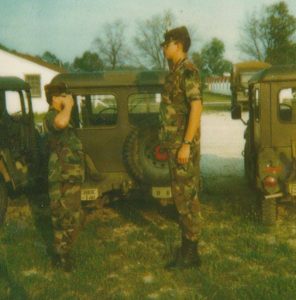
Our senior drill sergeant was about 5’ 2”. We got off the cattle truck and were in our first formation there at our basic training unit, and there stood the senior drill sergeant. We had our duffle bags laid out in front of us. Being 6’ 10” myself, the senior drill sergeant had to stand on the duffle bags so he could look me in the eye and, you know, do his intimidation thing. Most of the funny moments were related to my height. If a light bulb in the barrack needed changing, “Go get Fleischer!”
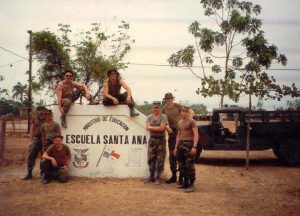
Most of the time, we were training to do things that you hope you never have to do. So, for me, the most rewarding time in the service was when we went to Panama to clean up after the invasion the late 1980s. We were sent to rebuild a school up in the mountains in a little town called Santana. We spent several weeks living in the school, and we spent most of our time with the local population. So, we got to know the Panamanian people pretty well there. That was really rewarding to use our training for something that was helpful to others.
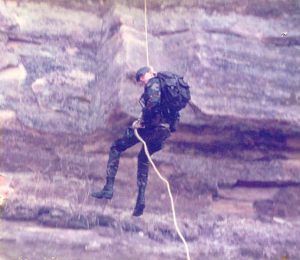
The United States Army trains and encourages soldiers to be problem solvers. I think that’s probably the most valuable asset that a drone pilot can have as they work through challenges in the field.
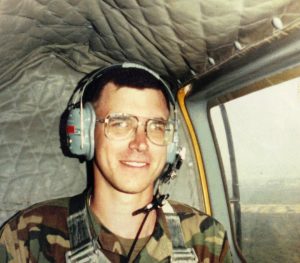
It’s been my experience that farmers view themselves as serving the country. As they used to say with the Army, “It’s not just a job, it’s an adventure.” I think farmers view their lifestyle as just that–it’s something that is vital to our country, and they do it because they love what they do. And they know that it’s bringing value not just to our country, but to the world.
Taranis role: Flight Operations Manager
Home state: Indiana
Military branch: Air Force
Rank: E5
Service period: 2001-2005
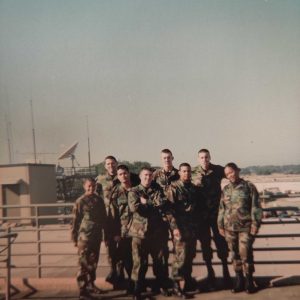
I’m a third generation military, and my grandpa was in the Marines in World War II. My dad was in the Navy during Vietnam, and I thought I would try another branch. I’ve always been fascinated with the Air Force. Growing up, I wanted to try another branch, and I thought maybe one day my son would join the Army and we can complete all four branches in our family.
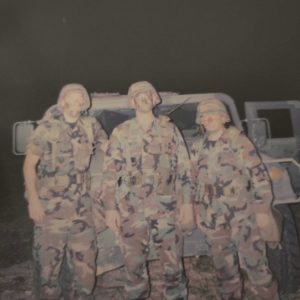
It’s to sacrifice your wants and desires for what you want to pursue in life–knowing that these sacrifices are not short-term even though in some aspects they do have a short term positive result. But in the long term, you’re protecting the next generations. And that was really important to me. I was sworn in two months before 9/11 happened, so it became very personal to me, and I understood very quickly–this is it, this is my mission. I’m here to protect my one day children, nephews, and nieces, et al.

I had a prescription for glasses, and I had to wear their military glasses (called BCGs in the military). I was doing pushups and PT. The sweat would completely fog up my glasses…drip on my glasses, and my glasses would always fall off, especially when you have to stand at attention. These drill instructors would make us stand at attention and hold for an hour out in the San Antonio sun. It was so uncomfortable. So, I actually took my glasses and hid them in my wall locker, which is where we store all of our uniforms and things. The drill instructors can do random searches of your wall locker to make sure everything is neat and orderly, and they did one of these inspections in my locker. So I was freaking out because if they found that I had these glasses and wasn’t wearing them–oh man. The drill instructor said, “Nevins, don’t you have glasses?” I said, “No, I don’t.” (trying not to laugh) And he said, “You sure about that?” as he’s searching through my wall locker and never found them. I don’t know how he didn’t find them–I mean, they literally rip your locker apart. They’ll throw your clothes across the room. So, needless to say I was pretty nervous and have no idea how I got one over on him.
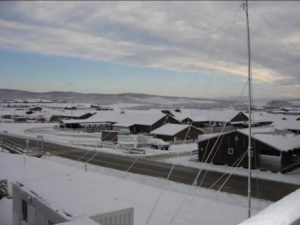
Yes, I did a six month stint in Kosovo. It was a NATO peace-keeping operation, trying to make sure that the elections were going smoothly. I was on an Army base because I traveled with the 81st Infantry, so I was one of 10 Air Force people on this massive army base. I didn’t necessarily have to follow the same rules as all the other soldiers. When I was off duty, I worked from 8 to 8 (12 hour shifts) and afterward I could go off base and walk through the villages. I actually got to help with the Ravens (they secure airplanes on the tarmac when there’s VIPs that come into town). So I would go on missions with them and help secure planes when ambassadors or the vice president at that time came in. It was fun just to see the countryside, and it really made my experience a lot better because I wasn’t confined to the Army rules.
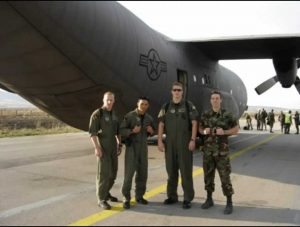
Reflect on your values and ask yourself if the military aligns with your core values. If you’re willing to sacrifice your life, make sure you’re doing it for the values you stand for and to protect those values.

A new strategic partnership between Taranis and Steward Link is easing the burden of program application and validating implemented conservation practices —unlocking significant revenue potential for growers.

Branding. It’s more than a logo. Your company’s brand ultimately represents an experience; every interaction a person has with your brand is an experience: good, bad, or indifferent. From the way the chosen color palette is perceived and the emotions it evokes to the phone call that ends with what we all hope is a friendly and knowledgeable voice on the other end of the line, it all matters.
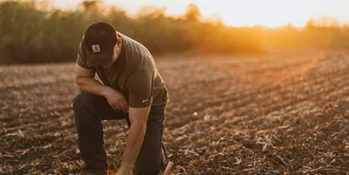
For Central Valley Ag’s (CVA)Trevor Cox and his team, those weeks through April and into the first half of May are where the rubber meets the road. Those weeks see the recommendations that led to on-farm decisions become reality. Those weeks launch #Grow24.